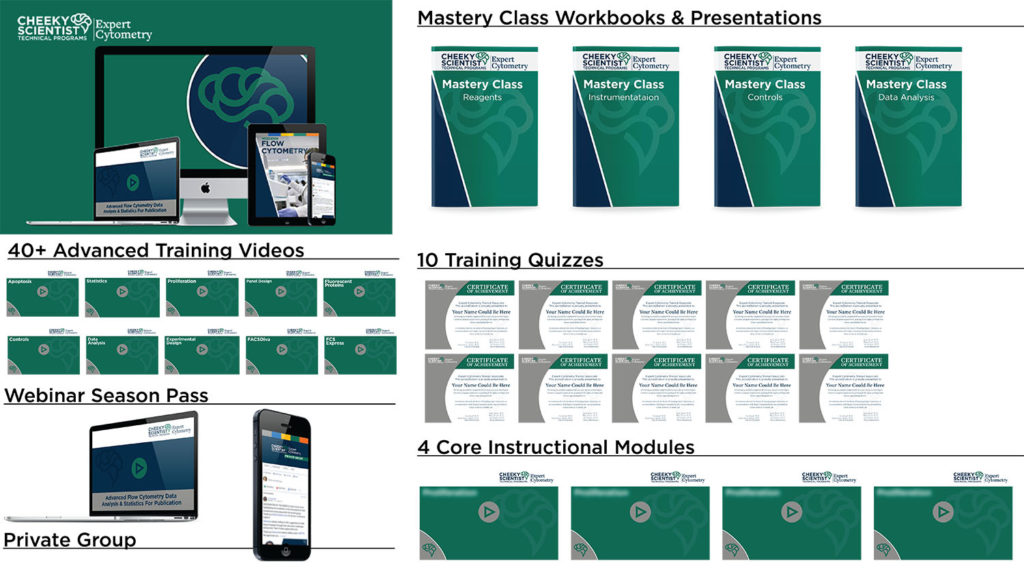Join The Waitlist For Expert Cytometry

The Expert cytometry training program is for scientists who want to:
- Stay up to date with current trends and best practices
- Gain advanced knowledge quickly (even if you’re a beginner)
- Learn how to control for any type of flow cytometry experiment
- Learn specific flow cytometry techniques and methodologies
- Get expert information on flow cytometry antibody panel design, experimental design, data analysis, and statistics

About Expert Cytometry
A PhD-level flow cytometry training program with 8 modules, each including a one-hour instructional video along with a downloadable Workbooks and Presentations.
After the completion of each module, you can test your expertise against quizzes and scored exams. Topics include Advanced Statistics, Advanced Experimental Design, Advanced Proliferation, Advanced Compensation, Advanced Data Analysis, Advanced Controls, Advanced Antibody Panel Design, Advanced Apoptosis, Advanced FCS Express, Advanced FACSDiva, Image Stream Analysis, Cell Sorting, CyTOF and Higher Order Analysis, Clinical Flow Cytometry, Microparticle Detection and Analysis, and much more.

Here's What You Get Immediate Access To After Becoming A Mastery Class Member

Module #1: Instrumentation
This module covers the process of generating data within a flow cytometer by covering the three major components of every instrument: fluidics, optics, and electronics.
We will explain how a particle goes from the “sample” to data file within the flow cytometer. The aim is to clarify how the three components of the cytometer are intertwined and work together to create the complex, rich data files that flow cytometry was developed to generate.

Module #2: Reagents
This module introduces users to the toolkit of specific probes most commonly used in flow cytometry to characterize the form and function of cellular and sub-cellular components and specimens.
We define fluorescence and describe common fluorescence processes that result in a measurable light signal that corresponds to biological phenotype or activity. Hundreds of natural and man-made fluorescent compounds are available to explore and measure biological phenomena. Different types of specific probes are introduced, including fluorescently tagged antibodies, transgenic fluorescent proteins, nucleic acid binding probes, fluorescent enzyme substrates, and cell division tracking dyes.
The merits of different fluorophores are compared in terms of brightness and usefulness in multiplex labeling strategies. Multicolor staining combinations maximize the amount of information gleaned from a single sample, but introduce special challenges due to overlap in the color of light emitted by many commonly used fluorophores. To separate and identify fluorescent signals from multiple probes we apply a mathematical correction to compensate for the natural crosstalk between many dyes.

Module #3: Controls
The aim of this module is to guide you, the user, regarding the possible sources of variation that may be encountered when preparing, collecting, and analyzing flow cytometry data.
Once the sources of variation are covered, techniques are presented to minimize variation and to yield high precision quantitation. Many of the techniques involve the use of appropriate bead standards for standardizing the instrument, compensation, flow rate, and event rate. In addition, tips are suggested regarding staining controls and the use of reference biological material. Lastly, data analysis strategies are presented that can be employed for objective region drawing.

Module #4: Data Analysis
In this module, you, the flow cytometry user, will receive an introduction to the basic parameters of flow cytometry data analysis.
Starting with the generation of the data file itself contained in the Flow Cytometry Standard, .FCS, we will discuss the various ways of presenting the raw data as graphical plots, how to draw regions and create gates, and the basic statistics used in many applications.
Lastly, we briefly touch on the subject of comparing data sets; that is, a group of control samples and a group of experimental samples, and how these data are generated.




